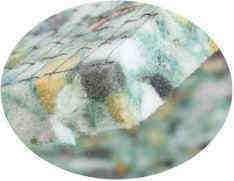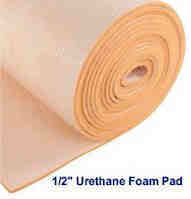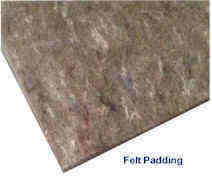How To Buy Carpet and Flooring Wisely
Carpet | Pad | Vinyl | Hardwood | Tile | Best Stores
Selecting the Right Carpet Pad
(aka Padding, Cushion, Underlay)
Carpet Padding - It's not all created equal!
There are many different types of carpet padding available today in order to accommodate all the various Carpet Types, Grades and Styles. Lets discuss all the various Types of Carpet Padding that you will encounter when shopping for new carpeting your home, office or rental property.
Padding Specifications
A certain type of padding thickness and density is required by every carpet manufacturer to maintain your carpet warranty. For most residential carpets, a 7/16" thickness is most common and either a 6-pound density or an 8-pound density will usually be selected.
Looped Berber styles and commercial grade carpets require special pads of higher density and reduced thickness to prevent wrinkles and increase carpet longevity. Check with the carpet manufacturer to see what type of padding is required under the carpet you select.
What is Padding Thickness
Don't make the mistake of thinking that a thicker pad will be a better pad. If you chose a padding that is too thick it can cause wrinkles to develop in your carpet. In most homes 7/16" is the thickest padding you would want to select to keep the carpet warranty in force.
Learn more about Carpet Styles | Learn more about Carpet Fibers
What is Padding Density
Padding is also rated by its density. The higher the padding density rating the more firm the feel is underfoot. Firmer pads provide better the support for your carpet. Better support means a lower chance for wrinkles to form over time.
Some pads have a low density rating of 3 to 5 pounds and are typically used in apartments because it is less expensive and will be replaced more frequently.
Looped Berber styles and commercial grade carpets require a special padding and you can call the manufacturer to get the correct padding requirements needed to keep from voiding your carpet warranty.
Padding used in residential applications usually has a density rating of 6 to 8 pounds, but 10-pound density pads are also available. Some pads are rated in ounces instead of pounds. For example, 128 ounces is the equivalent of an 8-pound pad. Rubber and synthetic pads are usually rated in ounces.
Some folks prefer the 6-pound density padding because it is softer underfoot. However, an 8-pound padding provides better support for your carpet and will generally make it wear better especially in higher traffic areas like stairs and hallways.
-
The higher the density, the more costly the pad will be.
-
Do not expect the carpet salesperson to choose the correct pad for you, it is your responsibility to make sure the correct pad is selected and installed.
-
If the wrong type, thickness or density pad is used, your carpet may develop wrinkles which is costly to fix and can significantly decrease the life span of your carpet.
Types of Carpet Padding
Rebond Pad (Best Bang for your Buck!)
 This type of pad is most common in the
residential setting. It is made from recycled materials, mainly from recycled
urethane foam and is multi-colored. It is available
everywhere, and in almost every thickness and density. Rebond is the most
economical choice for your home, rental or office. The photo shows a
7/16", 6-pound Rebond pad with a nylon mesh on the top which provides
added strength and durability.
This type of pad is most common in the
residential setting. It is made from recycled materials, mainly from recycled
urethane foam and is multi-colored. It is available
everywhere, and in almost every thickness and density. Rebond is the most
economical choice for your home, rental or office. The photo shows a
7/16", 6-pound Rebond pad with a nylon mesh on the top which provides
added strength and durability.
Not all Rebond padding is of high grade or top quality. Every padding manufacturer offers several grades of Rebond padding to their distributors. Retailers have a choice of which grade of Rebond padding to offer to their customers. The main difference will be the type of recycled materials used to manufacture the padding.
The higher the quality of recycled materials used, the better the Rebond pad will be. Reputable carpet dealers always offer top quality Rebond padding to their customers. The price you pay for a good quality padding may be slightly higher than at the shady discount carpet store down the street, however you should never skimp when it comes to buying a good quality padding to go under your good quality carpet.
What Homeowners Need To Know...
-
The Grade of Padding you select must MATCH the Grade of Carpet you select.
-
If you buy a carpet designed to last 15 years, then you must buy a padding that is designed to last at least 15 years.
-
Typical Cost for a 6 to 8-pound density Rebond pad is about $3.50 - $5.50 per square yard or about 39 to 45 cents per square foot.
-
Personally, I prefer the 8-pound, 7/16" Rebond padding for most residential applications.
Foam Padding (urethane)
 This type of pad is often very inexpensive
and lightweight. If a retail store tries to give you free pad with your carpet
purchase, this is usually what they plan to give you. This type of padding
will not tolerate much traffic. It will soon become completely flat as a
pancake after a year or so and is not a good choice for a residential setting. This
is often used in apartment settings where the carpet life-span is less than 3
years.
This type of pad is often very inexpensive
and lightweight. If a retail store tries to give you free pad with your carpet
purchase, this is usually what they plan to give you. This type of padding
will not tolerate much traffic. It will soon become completely flat as a
pancake after a year or so and is not a good choice for a residential setting. This
is often used in apartment settings where the carpet life-span is less than 3
years.
Prime Urethane Foam
Not made of recycled materials, this type of pad is called prime or virgin urethane. It's a better grade of foam pad (frothed foam) that could be a good choice for the home. It is made of very dense urethane (polyurethane). It is designed primarily for commercial applications, but is becoming more common in residential applications. The cost is more than a standard Rebond and not a common choice among homeowners.
Wool or Fiber Pad, Synthetic Fiber Pads
 These types of natural wool or synthetic pads are
used primarily for Berbers and commercial carpets. They are very dense,
breathe well, and are not spongy at all. They are made from recycled or shredded
fabrics or natural wool. They are designed to support and allow looped Berbers
and commercial carpets to wear well in heavy traffic situations, and to
prevent these types of carpets from stretching out and developing wrinkles. A
synthetic fiber pad is also a great choice for basements with concrete floors as it
breathes well, resists mold and mildew and has anti-microbial
properties
These types of natural wool or synthetic pads are
used primarily for Berbers and commercial carpets. They are very dense,
breathe well, and are not spongy at all. They are made from recycled or shredded
fabrics or natural wool. They are designed to support and allow looped Berbers
and commercial carpets to wear well in heavy traffic situations, and to
prevent these types of carpets from stretching out and developing wrinkles. A
synthetic fiber pad is also a great choice for basements with concrete floors as it
breathes well, resists mold and mildew and has anti-microbial
properties
Rubber Pad (waffle) or Rubber Slab (flat)
I seldom recommend using a rubber waffle pad in residential applications. Rebond padding is a much more economical choice and it does a great job at supporting your carpet as long the correct thickness and density is selected. Rubber slab padding is often used in commercial applications over concrete. Rubber padding density is usually rated in ounces, not pounds.
Specialty Pads:
Moisture Barrier, Odor Eating, Pet Stains, Air Filtration, Baking Soda Infused...
Some carpet salespeople may try to convince you to upgrade your order with a special pad that has big claims of being able to eliminate stains and odors or have a moisture barrier surface that will help reduce the severity of pet accidents. I don't generally recommend these type of pads and suggest you avoid the extra expense. I believe it will just cost you more money and not solve or diminish your pet accident problems.
If you have a pet accident problem there is no padding on the market today that I know of, that will solve your problems. Spending more money on a specialty pad will likely not reduce the severity of your pet accident problem. In many situations, I think a specialty pad might even make your pet accident problems worse.
Learn more about Moisture Barrier Padding
Don't Assume a Specialty Pad Will Solve Your Pet Urine Problems!
If you have a pet accident problem, upgrading to a more expensive pad will not help you. It won't make it easier to clean or reduce the severity of your problem. If you have a moisture problem in your basement, no moisture barrier padding is going to protect you from the dangers of mold and mildew.
Don't be fooled into thinking that spending more money on a specialty pad will solve your pet accident or moisture problems, it just doesn't work that way. You need to address your problems first and then I recommend you select a good quality pad that is designed to properly support your carpet and meet your needs and goals.
What is a Specialty Padding?
Should I spend $2 to $10 more (per square yard) for a Special Padding?
-
Odor-Eating Padding
-
Memory Foam Padding
-
Air-filtering Padding
-
Pet-Friendly Padding
These enhanced types of carpet padding are typically much more costly than a standard Rebond padding. They may offer certain benefits for some applications, but in most cases I do not believe any of these Specialty Pads are a wise or necessary choice for most homeowners.
I don't believe there is a measurable way for a homeowner to effectively determine if a specialty pad is providing any worthwhile, positive or beneficial effect over the lifespan of the carpet.
Should I Buy a Moisture-Barrier Pad?
-
All About Moisture-Barrier Carpet Padding
-
Learn more about Carpet Specifications
-
Learn more about Carpet Measuring
